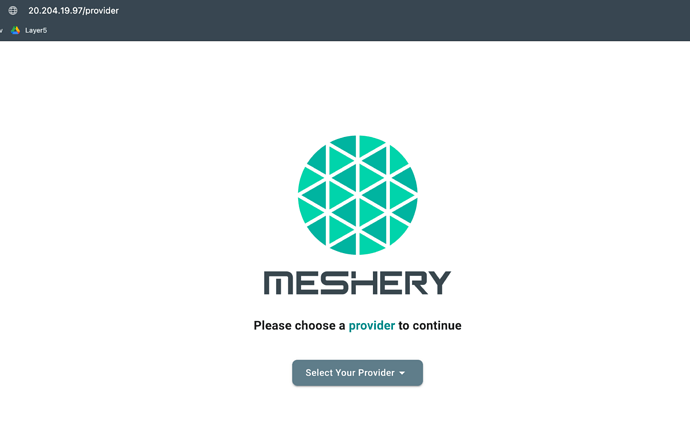Accessing Workloads behind a ingress-gateway always has been a industry standard practice in Kubernetes setup. It facilitate single entry point for all your services deployed in a production grade Kubernetes. This setup also allows you to leverage the service-mesh functionality of implementing policies and have a better authz and authn to the deployed services. Meshery is no different, you can configure it to be accessed through ingress gateway. Let’s see how can we configure it.
Prerequisite :
- Kubernetes is up and running.
- Ingress controller is installed and Ingress-gateway is provisioned (we will be taking istio into account in this example and it is installed in
istio-systemNamespace) - Meshery is installed in your Kubernetes cluster (Preferably in
mesherynamespace)
See in Action
Step 1: Prerequisite check
Lets see if everything mentioned in prerequisite is fulfilled
$ kubectl get svc -n istio-system
NAME TYPE CLUSTER-IP EXTERNAL-IP PORT(S) AGE
istio-ingressgateway LoadBalancer 10.3.9.186 20.204.19.97 15021:30305/TCP,80:32107/TCP,443:32436/TCP 37d
We have ingress gateway provisioned.
$ kubectl get po -n meshery
NAME READY STATUS RESTARTS AGE
meshery-5cc4489f77-7sbc5 1/1 Running 0 33d
meshery-operator-5db8b6c874-5cdvg 1/1 Running 0 33d
meshery-meshsync-8lb8b6y784-6ghnk 1/1 Running 0 33d
meshery-istio-6c56dd44fb-gk6xx 1/1 Running 0 33d
$ kubectl get svc -n meshery
NAME TYPE CLUSTER-IP EXTERNAL-IP PORT(S) AGE
meshery LoadBalancer 10.3.9.178 10.5.3.188 9081:31037/TCP 33d
Now we see that Meshery’s core components meshery, meshery-operator, meshery-meshsync, meshery-istio (meshery adapter specific to your servicemesh), and meshery LoadBalance service (meshery) are up. The istio ingress gateway istio-ingressgateway is also up.
Note :
- you can observe that the
CLUSTER-IP&EXTERNAL-IPof the MesheryLoadBalancerare private IP (10.5.3.188, 10.3.9.178) that means you can not connect it from the browser or outside of the kubernetes cluster. - in the other hand if you observe we have got an public ip for the
istio-ingressgateway(20.204.19.97) which can be accessed from outside of the cluster. - Only way to access the Meshery id through our ingress gateway (which is part of ingress controller Istio in this case)
Step 2: Let’s create a istio-Gateway for this meshery, which will facilitate meshey to recive the request from outside of cluster to Meshery.
Tip:
What is istio-Gateway?
Gateway describes a load balancer operating at the edge of the mesh receiving incoming or outgoing HTTP/TCP connections. The specification describes a set of ports that should be exposed, the type of protocol to use, SNI configuration for the load balancer, etc.
More information : Istio / Gateway
create a file meshery-istio-gw.yaml and copy paste the below content to the file.
apiVersion: networking.istio.io/v1alpha3
kind: Gateway
metadata:
name: meshery-gateway
namespace: meshery
spec:
selector:
istio: ingressgateway
servers:
- port:
number: 80
name: http
protocol: HTTP
hosts:
- "*"
Now let’s apply this manifest in meshery Namespace.
$ kubectl apply -f meshery-istio-gw.yaml
Tip:
Istio gateway is namespace scoped.
The gateway listener for meshery listens on port80
Step 3: Lets create a virtualService for Istio gateway to reach Meshery Loadbalancer in the kubernetes cluster
Tip:
What is virtual service?
A VirtualService defines a set of traffic routing rules to apply when a host is addressed. Each routing rule defines matching criteria for traffic of a specific protocol. If the traffic is matched, then it is sent to a named destination service (or subset/version of it) defined in the registry. More info: Istio / Virtual Service
create a file meshery-istio-vs.yaml and copy paste the below content to the file.
apiVersion: networking.istio.io/v1alpha3
kind: VirtualService
metadata:
name: meshery
namespace: meshery
spec:
hosts:
- "*"
gateways:
- meshery-gateway
http:
- match:
- uri:
prefix: /
route:
- destination:
host: meshery
port:
number: 9081
Now let’s apply this manifest in meshery Namespace.
$ kubectl apply -f meshery-istio-vs.yaml
Tip: istio virtualService is namespace scoped.
Understanding the meshery-istio-vs.yaml
When the request hits the istio ingress gateway (the gateway listener for meshery listens on port 80) with prefix “/” (root) it will forward it to the kubernetes service meshery which exists in meshery Namespace and listing on 9081 (The default port of Meshery)
Step 4: Accessing Meshery
Now you can access meshhery UI with http://<ingress-gateway-ip>/
in this context http://20.204.19.97/
Tip:
when you hithttp://20.204.19.97/it will automatically redirect you tohttp://20.204.19.97/providerand you will she the meshery UI as below:
Extras :
You can use fqdn (let’s say meshery.example.com) for accessing meshery. In that case you have to replace "*" field under hosts: section in meshery-istio-vs.yaml and meshery-istio-gw.yaml to meshery.example.com.
Hope this Helps !
